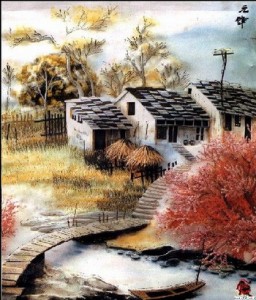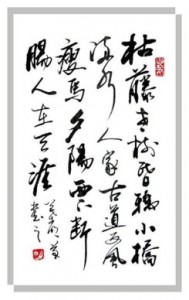In the tune of "Pristine Sand under Heaven": Fall Meditation
by Ma Zhiyuan (1250-1321)
小桥流水人家;
古道西风瘦马,
夕阳西下,
断肠人在天涯!
Tr. YK Chan 陈耀国译
On a wilted vine, on an old tree, at dusk a crow roosts.
A quaint footbridge, water running under, crosses over to a homestead.
On an ancient trail westerly wind blows while a gaunt horse wanders.
Sun setting west,
The heart-broken is lost on the edge of heaven.





天净沙·秋思 元·马致远
枯滕,老树,昏鸦。
小桥,流水,人家。
古道,西风,瘦马。
夕阳西下,
断肠人在天涯。
Tune: Sunny Sky Over Clear Sand
“Autumn Thoughts” Ma Zhiyuan (Yuan)
To withered-vine entwined old trees, return the ev’ning crows.
Through a small bridge, the clear stream around a homely house flows.
Lonely ancient road, west wind swept, the lean horse trots along.
The sun sets in the west and is gone.
Heart-broken, on life’s journey far from home I soldier on!
(tr. frank c w yue)
hi, y k,
may i post an alternative (and hopefully more faithful) rendition of this famous and popular yuan ‘qu’ in 13 syllable verse with the original AAAAA rhyme. thanks!
Tune: “Tian Jing Sha” (Clear Sky and Sands)– Autumn Thoughts
by Ma Zhiyuan (1250-1321)
On dried-vine-entwined old trees, rest crows when the day’s done,
Through a small bridge by a house, the stream’s ne’er ceased to run,
On an antique road, west wind swept, a gaunt horse does run,
In the west sets the sun,
O At the verge of the sky is the heart-broken one!
frank
“an antique road”–a collectible?
“swept”–Why past tense/participle?
“verge of the sky” or “brink of heaven”?
hi, y k,
1. ‘antique’ is a synonym for ‘ancient’.
(antique road = ancient road)
2. this is an inversion and it refers to the immediately preceding ‘ancient road’ swept by the chilly west wind…
3. verge of the sky = at the horizon = the end of the earth.
“brink of heaven” might be somewhat misleading in things like “going to heaven”.
frank
1. Caution: Synonyms are related words of similar meaning, but they have different connotations. Can we say that the Great Wall is an antique wall? Ask a native English speaker, if you wish.
2. Do you mean passive voice?
3. At the boundary of firmament without entering it
thanks, y k,
about this one?
Tune: “Tian Jian Sha” (Sunny Sky Over Clear Sand)
–“Autumn Thoughts” Ma Zhiyuan (Yuan Dynasty)
Toward dried vines, old trees, ev’ning crows fly,
Small bridge, some homesteads, stream flows by,
On west-wind swept o’road, gaunt horse ply,
The sun sets in the west sky,
At earth’s end, heartbroken am I!
frank
-The correct pinyin spelling of the tune should be “Tian Jing Sha”.
-ol’road; gaunt horse plies—This line is a bit contrived in order to rhyme on the same tone throughout. The original poem is not in this rhyming pattern.
-I am not sure Ma referred himself as heartbroken. You make it sound this way only for rhyming.
hi, y k,
thanks for your input.
(i was v busy the last few days as a dear friend was dying; now she’s in heaven. God bless her gentle soul!)
1. correct pinyin noted.
2. for the ‘antique road’, i know this is not colloquial; what i had in mind was ‘antique trade route’ as in the famed 荼馬古道 in ‘古道’. so it should be
rendered probably as ‘antique (trade) route’.
3. as ‘天涯’ is ‘tian ya’ in putonghau, ma zhiyuan’s ‘yuan qu’ is of the AAAAA rhyme scheme (with an ‘a’ or ‘ah’ sound.) so, my rhyme scheme of
‘fly, by, plies, sky, I’ is faithful a la the original.
4. of course, grammatically speaking, it should be ‘Antique route, west wind,
gaunt horse plies.’ (for line 3). am checking further with andrew wong to see if ‘ply’ could be deemed acceptable (as i’ve seen it so used, not the same word of course, by some famed english poet.)
5. to me, ‘断肠人’ is a heartbroken or forlorn (uncared for, forsaken) person.
frank
frank
Frank, may your friend rest in peace.
1. Pinyin is a currently accepted phonetic system for the standard transliteration of 普通话 putonghua (common [Mandarin] Chinese dialect).
2. 荼馬古道 is your conjecture. Ma Zhiyuan did not specify this route. Its name does not have the connotation of ‘antique’, rather ‘antiquity’. It did not deal with antiques either.
3. The ending of each line of Ma’s poem is ‘-a’ or ‘-ia’, which is a diphthong. They are not of exactly the same tonality.
4. It is hard to imagine a gaunt horse regularly traveling (plying) over an old trade route as you imply it doing its job.
5. Do you really think of Ma Zhiyuan’s self-pity in his poem? Why?